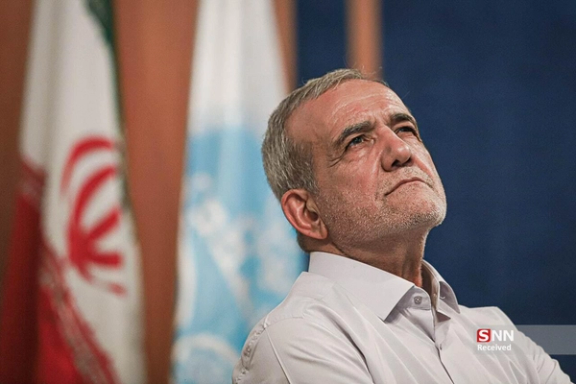Pezeshkian and his cabinet begin dealing with challenges

While the conservative-dominated Parliament's approval of his cabinet may have buoyed Masoud Pezeshkian, his administration now faces numerous serious challenges that require urgent attention.

While the conservative-dominated Parliament's approval of his cabinet may have buoyed Masoud Pezeshkian, his administration now faces numerous serious challenges that require urgent attention.
These challenges span a broad spectrum, including foreign policy and pressing economic issues such as the budget deficit, corruption, inflation, housing shortages and unaffordability, and high fuel subsidies draining the treasury.
During an event on Tuesday to introduce the new oil minister, Mohsen Paknejad, Pezeshkian criticized the allocation of massive fuel subsidies. This remark was widely interpreted as a signal that fuel prices may increase, despite the minister's earlier assurances that no such plans were in place. So far, no clarification has been provided.
The crippling strike of thousands of nurses that has spread to several cities now is another major and urgent issue to be addressed. The minister of health, Mohammad-Reza Zafarghandi, has promised to resolve the problem of the long overdue payments, but nurses’ demands go much beyond the payment of owed salaries.
Meeting the expectations of large groups of reluctant voters, who voted for Pezeshkian because he vowed to address Iran's multiple crises, is another serious challenge. These voters expected see more rational governance, justice, economic improvement and to have more women in the cabinet and at least some ministers from among Sunnis and ethnic minorities.
Since the cabinet's approval, three more women have been appointed to government positions in the past few days. These appointments include a Special Assistant to Vice President Mohammad-Reza Aref, a Deputy Head of the Department of Environment, and a government spokesperson.
The appointment of Fatemeh Mohajerani as government spokesperson is a first in the history of the Islamic Republic. The appointment announced Wednesday was welcomed by many social media users who called Mohajerani a “brave woman” for a fiery speech she delivered at one of Pezeshkian’s campaign gatherings.
In her speech she not only mentioned a young protester killed by security forces during the Woman, Life, Freedom protests by name but also referred to him as a “martyr”. As a mother, she said in her speech, she would not “allow the blood of the youth to color the streets.”
However, some dissidents and critics see her as an opportunist who used the names of government victims to squeeze herself into Pezeshkian's team, while it is unclear if she is a real reformer.
The appointment of a Sunni deputy, also a first in the history of the Islamic Republic, is another step Pezeshkian has taken in the past few days to appease the critics. Abdolkarim Hosseinzadeh who has been appointed as rural and deprived area’s development deputy is a reformist politician and former lawmaker from the Kurdish cities of Naghadeh and Oshnavieh.
Appointment of one Sunni deputy is unlikely to do much to appease the Sunnis who make up between five to ten percent of the Iranian population, most of whom also belong to ethnic minority groups such as Kurds, Baluchis, and Turkmen.
Many reformists remain unconvinced by Pezeshkian’s assurances that the ministers he selected, with Supreme Leader Ali Khamenei’s approval, will prove their efficiency given time.
The return of Mohammad-Javad Zarif to the cabinet as Pezeshkian’s “Strategic Deputy” is one of the steps Pezeshkian has taken to placate disappointed supporters in the 'reform' camp.
The government also seems to be taking measures to ease tensions in Iranian universities for the upcoming academic year. As an initial move, Ali Sharifi-Zarchi, a prominent lecturer at Sharif Industrial University who was dismissed for supporting student protesters during the Woman, Life, Freedom movement, has been reinstated to his academic position.
This move could significantly enhance Pezeshkian’s standing in academia if followed by the reinstatement of other dissident professors who were dismissed or forced into early retirement in recent years, as well as students who were suspended or expelled for their political activism or defiance of hijab rules.
The issue of hijab enforcement is one of the big challenges that Pezeshkian’s government is facing. Brigadier General Eskandar Momeni's appointment as interior minister disappointed many, who hold him responsible for crackdowns on anti-government protests and defending hijab enforcement. Momeni has not commented on the issue of social freedoms so far.